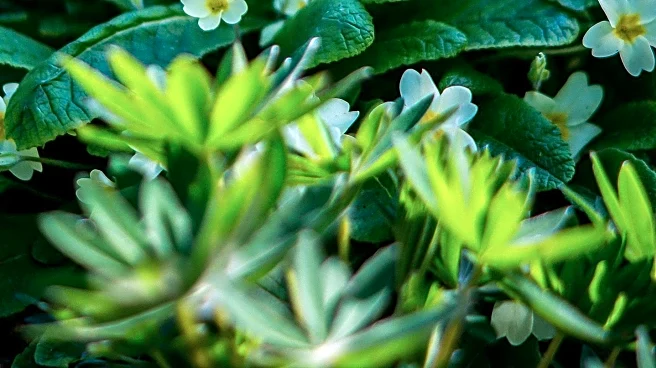What's Happening?
As September arrives, Southern California gardeners are advised to start preparing for winter greens and spring blooms. This transitional period marks the end of summer and the beginning of school, alongside the return of seasonal favorites like pumpkin spice. Gardeners are encouraged to plant seeds and bulbs such as sweet peas, lettuces, kale, and broccoli to ensure a fruitful harvest in the coming months. Yvonne Savio, a gardening expert, suggests focusing on cool-weather crops and enriching soil with compost and organic fertilizers. Additionally, local nurseries offer starter packs and seeds for various plants, including beets and sweet peas, which are known for their fragrance and beauty.
Why It's Important?
Gardening during this transitional period is crucial for ensuring a successful harvest of winter greens and vibrant spring blooms. It provides an opportunity for individuals to engage with nature and find solace amidst ongoing global challenges. The act of gardening can serve as a therapeutic escape, offering a sense of stability and continuity. Moreover, planting cool-weather crops can contribute to sustainable living by reducing reliance on store-bought produce. This practice not only supports local agriculture but also promotes environmental conservation by encouraging the growth of native plants.
What's Next?
Gardeners are encouraged to participate in upcoming events and workshops to enhance their gardening skills. The UC Master Gardeners of Los Angeles County are offering Grow LA Gardens classes, providing basic gardening education. Additionally, various plant-related activities and events are scheduled throughout September, including farmers' markets, plant shows, and gardening classes. These events offer opportunities for community engagement and learning, fostering a collaborative environment for gardening enthusiasts.
Beyond the Headlines
The emphasis on gardening during this transitional period highlights the broader cultural and environmental significance of sustainable practices. It underscores the importance of connecting with nature and cultivating resilience in the face of adversity. As individuals engage in gardening, they contribute to the preservation of biodiversity and the promotion of ecological balance. This movement towards sustainable living reflects a growing awareness of environmental issues and the need for proactive measures to address them.









